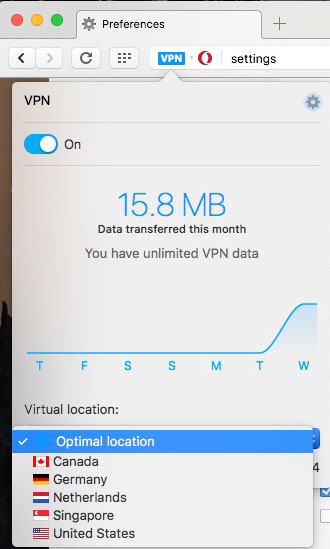

Don’t expect to be able to watch an overseas version of Netflix, though: The service reportedly uses rotating IP addresses, and though I was able to log into Netflix UK, only one of three shows actually began playing. I did download the SurfEasy VPN plugin for Chrome, and I can report that the service works as advertised, though slowly. More location options will be available as Opera rolls out this feature in release form.

You can select an IP address in the United States, Canada, or Germany. What Opera tells me, however, is that the VPN encrypts data with 256-bit encryption, hiding your actual IP address behind a virtual one. After re-downloading and re-installing the browser, though, I still experienced the crash-on-launch bug. I tried manually cleaning out the files, removing most of them. I tried uninstalling it, and received error messages. I haven’t been able to open it since, as it promptly crashes on launch. (A popup window in the ad-blocking edition, on the other hand, alerted me that the feature was there, and how and why to take advantage of it.) I closed and restarted the browser.

I didn’t notice anything within the interface that signaled whether the VPN service was working. Normally, SurfEasy’s unlimited VPN service costs $3.99 per month and includes support for up to five devices-including Mac and Android devices. Now that the service has been integrated into the developer edition of the Opera browser, however, all of those limitations have apparently gone away. Follow them on Twitter, and it’s 100MB more, and so on. Confirm your email, and you’ll receive 250MB more. Just by signing up with an email address, you’ll receive 500MB of secured data per month, for free. Today, you can take advantage of SurfEasy’s network through downloadable plugins from Chrome and the release version of Opera.

This is what you’ll normally pay for the SurfEasy services. (A few days ago, SurfEasy promised to protect BitTorrent downloads, possibly preparing for the Opera launch.) About a year ago, Opera bought SurfEasy, a Canadian VPN provider whose network Opera is apparently using as the backbone of its services. The integrated VPN may not be that surprising if you’ve been watching Opera for long. Second: What will the performance of the VPN network (and the browser, too) be under load? No surprise to Opera watchers There are two major questions that Opera will need to answer, though: First, what are the terms of service of the VPN, and the acceptable use policy? “Unlimited” services rarely are. Why this matters: Free, unlimited VPN is an enormous coup for Opera.


 0 kommentar(er)
0 kommentar(er)
